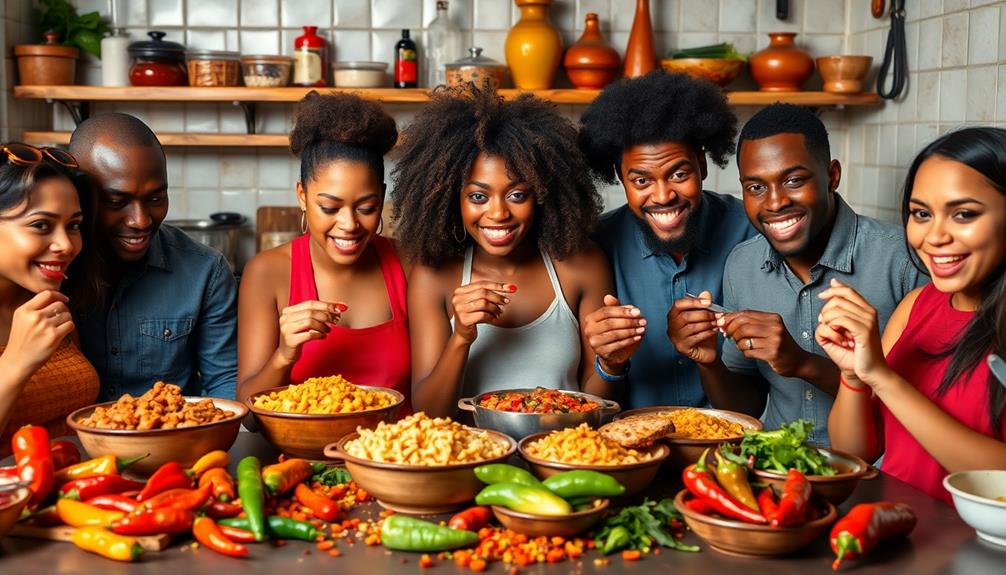Your spice tolerance might be more connected to your personality than you think. If you're adventurous or a thrill-seeker, you're likely to enjoy spicy foods more. People with these traits often find excitement in the heat, viewing it as a challenge. Genetics play a role too, accounting for a significant portion of your spice response. Regularly exposing yourself to spicy dishes can help increase your tolerance over time. Cultural background also shapes your preferences, as early experiences with spice can leave lasting impressions. Discovering the depths of these connections can really enhance your culinary adventures.
Key Takeaways
- Adventurous individuals are more likely to enjoy spicy foods due to their risk-taking personality traits and desire for intense experiences.
- Thrill-seekers find excitement in capsaicin's heat, viewing spicy foods as exhilarating challenges that enhance their culinary exploration.
- Openness to experience and extraversion correlate with a willingness to try and enjoy spicy dishes, influencing spice tolerance levels.
- Regular consumption of spicy foods can desensitize TRPV1 receptors, increasing tolerance and enhancing enjoyment among those with bold personalities.
- Cultural exposure and early experiences with spicy cuisine significantly shape individual spice preferences and tolerance across different personality types.
Understanding Spice Tolerance
Understanding your spice tolerance can reveal a lot about your genetic makeup and sensory receptors. Spice tolerance is heavily influenced by the sensitivity of your TRPV1 receptors, which detect capsaicin—the compound that causes that fiery sensation in spicy foods. If you've got fewer TRPV1 receptors, you probably feel less pain from capsaicin, meaning you can handle spicier dishes with ease.
For instance, dishes like Mushroom Masala can be enjoyed at various spice levels, showcasing how personal preferences vary widely.
Genetics play a significant role too, accounting for 18-58% of the variation in how people respond to spice. This means your unique genetic profile greatly impacts your spice tolerance. Additionally, if you regularly eat spicy foods, your TRPV1 receptors can become desensitized, letting you enjoy higher heat levels than someone who rarely indulges.
Cultural exposure also shapes your spice tolerance. If you grew up in a household where spicy flavors were common, you likely developed a preference for heat from an early age.
Fundamentally, understanding your spice tolerance isn't just about personal preference; it's a reflection of your biology and life experiences, showing how deeply interconnected our genetics and sensory experiences can be.
Personality Traits and Food Preferences
If you love the thrill of trying new and spicy dishes, it might be tied to your adventurous personality traits.
Risk-takers often find excitement in the heat of capsaicin, blending their food choices with their lifestyle.
For instance, dishes like Sichuan Cold Noodles showcase bold flavors that appeal to those who crave a little excitement in their meals.
Understanding how these traits influence your food preferences can reveal a lot about your relationship with spice.
Thrill-Seeking and Spicy Foods
Thrill-seekers often gravitate toward spicy foods, driven by their desire for novel and intense experiences. If you identify with this personality trait, you likely enjoy the rush that comes from the heat of capsaicin, pushing your taste buds to the limit.
Research shows that individuals like you're more likely to savor spicy dishes, finding pleasure in the burn and the adventure it brings. In Korean cuisine, for instance, dishes like kimchi offer a bold combination of spices and fermentation that can excite your palate.
Imagine indulging in:
- A fiery curry that ignites your senses
- Zesty jalapeños layered on a cheesy nacho platter
- A tangy hot sauce drizzled over grilled chicken
- A bowl of kimchi, bursting with flavor and spice
These tantalizing options not only satisfy your hunger but also fuel your quest for stimulation.
Studies indicate that early exposure to spicy foods can enhance your preferences, making you even more adventurous. As you embrace the piquant thrill of spicy foods, you're not just tasting; you're experiencing life at its fullest.
Risk-Taking Behavior Influence
Often, those with a penchant for risk-taking find themselves drawn to spicy foods, viewing the heat as an exhilarating challenge rather than a mere taste test. If you're someone who thrives on sensation-seeking, you might relish the experience of spicy food more than others. For you, the discomfort of heat transforms into excitement, making each bite an adventure.
The thrill of trying dishes that incorporate bold flavors, like the invigorating zing of Hiyashi Chuka during summer, can further enhance your culinary exploration. Research shows that individuals with higher levels of risk-taking personality traits are more likely to enjoy spicy cuisines. This correlation suggests that adventurous souls interpret the burn of chilies as a thrilling experience rather than pain.
You may even find yourself enjoying the psychological aspect of benign masochism, where the discomfort of spicy food becomes a source of pleasure. Furthermore, traits like openness to experience and extraversion can enhance your willingness to try diverse spicy dishes.
If you're always on the lookout for unique flavors and intense experiences, spicy food might just be your perfect culinary playground. Ultimately, embracing the heat connects your personality with your palate, showcasing how risk-taking can flavor your dining experiences.
Genetic Factors in Spice Sensitivity
Genetic factors greatly influence how you experience the heat of spicy foods, with studies showing they account for 18-58% of the variation in individual spice tolerance. Research indicates that identical twins often share similar preferences for capsaicin, emphasizing the hereditary basis for your spice sensitivity.
Although no specific gene has been pinpointed, variations in the TRPV1 receptor play an essential role in determining how your body reacts to spicy flavors. Notably, many traditional African dishes, such as Muamba De Galinha, showcase a variety of spices that may challenge even the most seasoned spice lovers.
Consider these captivating aspects of genetic spice sensitivity:
- Individuals with fewer TRPV1 receptors experience less pain from spicy foods.
- Some people might find certain spicy dishes enjoyable, while others perceive them as overwhelmingly hot.
- Genetic predisposition can dictate whether you reach for that extra jalapeño or shy away from the heat.
- Environmental influences are present, but they pale in comparison to the genetic factors that shape your reactions to capsaicin.
Understanding these genetic components can help you appreciate why your spice tolerance differs from those around you.
Role of Sensation Seeking
If you're someone who craves adventure, you might find that your love for spicy foods aligns with your thrill-seeking nature.
People who enjoy risk-taking often have a heightened tolerance for intense flavors, seeking out the excitement that spicy dishes bring.
This connection between sensation-seeking behavior and spice preference reveals how personality traits can shape your culinary choices, similar to how those who enjoy rich comfort foods like squash casserole might also seek out bold flavors in their meals.
Thrill-seeking Behavior
Thrill-seeking behavior drives individuals to explore new experiences, including the bold flavors of spicy foods. If you find yourself drawn to the heat of chili peppers, you might just be one of those adventurous souls who thrives on intense sensations. Your appetite for the fiery kick can be linked to your personality traits that crave novelty and excitement.
Many street foods, like the spicy Sai Oua (Northern Thai sausage), offer a burst of flavors that can satisfy your craving for heat and adventure.
Imagine savoring:
- The fiery heat of a ghost pepper sizzling on your tongue
- A fragrant curry bursting with spices that tantalize your taste buds
- The rush of endorphins as you take a daring bite of spicy sushi
- The thrill of competing against friends in a spicy food challenge
Research supports that those who score high in sensation-seeking are more likely to enjoy spicy dishes, reflecting their willingness to embrace risks and challenges.
This connection also ties into the concept of benign masochism, where you derive pleasure from safe pain sensations, like the burn from capsaicin.
Adventure and Spice Preference
For those who crave adventure, spice preference often reveals a deeper connection to sensation-seeking traits. If you've ever found yourself reaching for the hottest sauce on the menu, you might be one of those thrill-seekers who enjoy spicy foods.
Research shows that individuals with high sensation-seeking personality traits are more likely to embrace intense flavors and experiences. The heat from capsaicin—the compound responsible for spiciness—can induce a pleasurable pain sensation, enhancing your overall enjoyment of spicy dishes. This connection can be seen in Brazilian cuisine, where dishes like Caruru showcase a bold blend of spices that thrill the palate and reflect cultural influences.
As someone who thrives on novelty, you probably find that adventurous eating aligns perfectly with your lifestyle. Your higher tolerance for spicy foods reflects a willingness to embrace discomfort, which is closely tied to the psychological concept of benign masochism.
This phenomenon explains how you derive pleasure from mild pain and discomfort, making that fiery curry all the more appealing.
Studies indicate that your spice preferences are influenced by your personality traits, leading to varied tolerance levels among individuals. So, the next time you savor a spicy meal, remember it's not just about the flavor; it's also about feeding your adventurous spirit!
Risk-Taking and Tolerance
The link between risk-taking and spice tolerance becomes even clearer when considering how sensation-seeking drives your culinary choices. If you're someone who thrives on adrenaline, you likely find joy in the fiery kick of spicy foods. For thrill-seekers like you, each bite is an opportunity to embrace the intense sensations that spice brings, aligning perfectly with your risk-taking tendencies.
You might even enjoy hosting gatherings where you serve dishes that challenge your friends' spice limits, like a layered Graveyard Taco Dip full of flavor and fun.
Imagine yourself:
- Savoring a plate of fiery chili that sets your taste buds ablaze.
- Experimenting with hot sauces that challenge your heat limit.
- Sharing stories of your daring culinary adventures with friends.
- Relishing the rush of endorphins that comes from controlled discomfort.
Research shows that as you venture into bolder spice levels, you increase your tolerance over time. Your adventurous spirit encourages you to seek out novel experiences, transforming each meal into a daring escapade.
This connection between your personality and food choices reveals that your love for spice isn't just about taste; it's about the thrill of risk-taking and the pleasure derived from pushing your limits. Embrace your inner sensation-seeker and enjoy the exhilarating world of spicy cuisine!
Desensitization Through Exposure
When you immerse yourself in the world of spicy foods, your body starts to adapt in captivating ways. This adaptation centers around a process known as desensitization, where your sensory receptors adjust to handle the heat. Regularly consuming capsaicin—the compound that gives spicy foods their kick—leads to a decrease in sensitivity of the TRPV1 receptors.
As a result, you might find that you need higher amounts of capsaicin to experience the same burning sensation you once felt. Curiously, just like how seasonal ingredients enhance dishes such as Nettle and Potato Soup, consistent exposure to heat can elevate your culinary experience.
Studies show that individuals who frequently indulge in spicy dishes report a diminished pain response to capsaicin over time. This means that not only do you develop a higher spice tolerance, but your overall enjoyment of spicy foods can also increase.
Your body's desensitization to spice alters how you perceive heat, transforming a potentially painful experience into one that's pleasurable.
In essence, the more you expose yourself to spicy foods, the more your body adapts, making that fiery flavor feel less intense. So, if you're looking to enhance your spice experience, immerse yourself in those hot dishes regularly and enjoy the journey of desensitization!
Cultural Influences on Spice Enjoyment
Growing up surrounded by spicy foods can considerably shape your tolerance and enjoyment of heat in your meals. If you were introduced to spicy flavors early on, you likely have a greater appreciation for them now.
Cultural exposure to spicy foods plays a significant role in how you perceive and enjoy heat. In many cultures, eating spicy dishes isn't just about flavor; it's a social experience that fosters connection and shared enjoyment.
Imagine the warmth of:
- A bustling family gathering filled with laughter and sizzling curries.
- Friends daring each other to try increasingly fiery chili sauces.
- Celebrations where spicy dishes symbolize courage and resilience.
- Street vendors serving up mouthwatering tacos with a kick.
These experiences create positive associations with spice, encouraging you to embrace heat rather than shy away from it.
In cultures where spicy foods are a staple, the norm is to enjoy the burn, leading to higher levels of enjoyment and a willingness to seek out more heat in meals. Your cultural background can make all the difference in how you approach spice, turning each meal into an adventure.
Building Personal Spice Tolerance
By gradually increasing your intake of spicy foods, you can effectively build your personal spice tolerance. Start by incorporating small amounts of chili flakes into your meals. This not only introduces capsaicin slowly but also allows your TRPV1 receptors to adapt, making them less sensitive over time.
As you regularly expose yourself to higher spice levels, you'll find that the initial burning sensation becomes more manageable. Research shows that frequent spicy food eaters often require higher levels of capsaicin to achieve the same burning sensation as those who indulge occasionally.
This desensitization is a natural response, enabling your body to adjust to the pain associated with capsaicin. As you persist with spicy foods, you'll not only tolerate the heat better but also develop a greater appreciation for their unique flavors.
Engaging with spicy foods consistently enhances your enjoyment and helps in building personal spice tolerance. Remember, patience is key; it may take time to appreciate that extra kick fully.
Frequently Asked Questions
What Kind of Personality Likes Spicy Food?
People who enjoy spicy food often have adventurous, thrill-seeking personalities. You likely seek novel experiences and embrace discomfort, finding pleasure in intense flavors that challenge your senses and elevate your dining adventures.
What Does Psychology Say About People Who Like Spicy Food?
When you plunge into a fiery dish, psychology suggests you crave the thrill. Your adventurous spirit seeks the rush, relishing the heat like a rollercoaster ride, turning discomfort into excitement and savoring each intense bite.
Why Do Some People Have High Spice Tolerance?
Your spice tolerance can stem from genetics, the number of TRPV1 receptors you have, and regular exposure to spicy foods. Cultural influences and personal experiences also shape how much heat you can handle.
Which Race Has the Highest Spice Tolerance?
While it's tempting to generalize, you'll find that individuals of South Asian descent often exhibit higher spice tolerance due to cultural exposure. However, personal experiences and preferences can vary widely within any racial or ethnic group.
Conclusion
In the vibrant tapestry of flavors, your spice tolerance dances to the beat of your personality. As you explore the fiery depths of your palate, remember that each bite is a step toward understanding yourself. Embrace the heat, for it reveals not just your taste but also your spirit. With every sizzling experience, you can build a resilience that harmonizes with your unique traits, transforming your culinary journey into a thrilling adventure of self-discovery.










